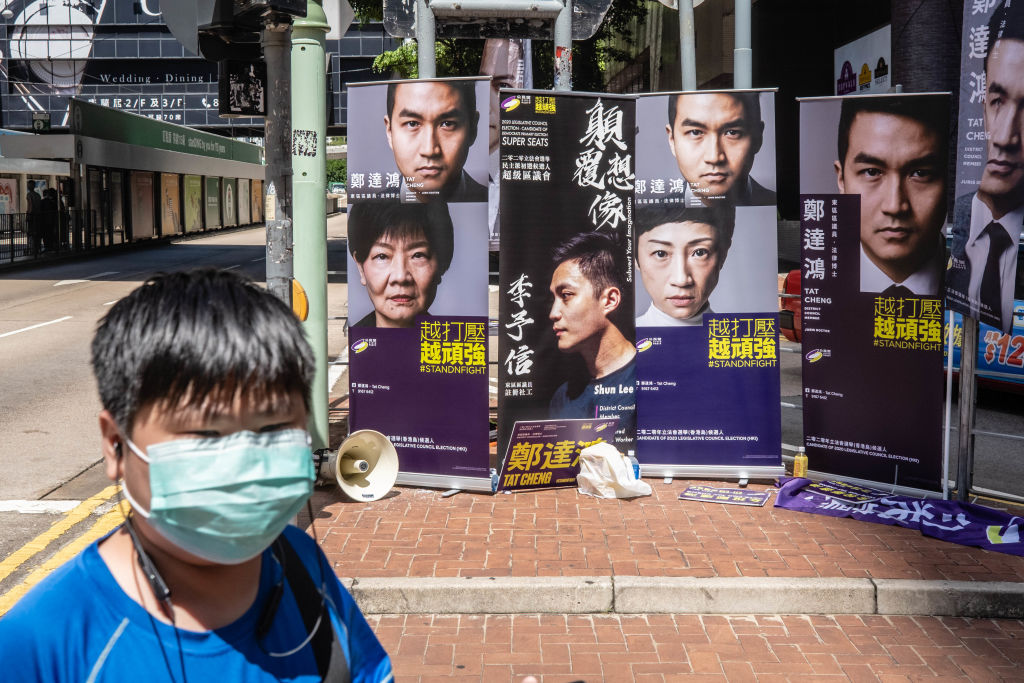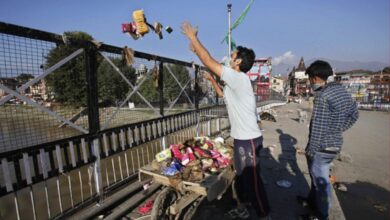Twelve opposition candidates in the legislative elections including the charismatic Joshua Wong were disqualified by the local authorities.
Closed faces and dark outfits, their portraits have been circulating for several weeks in Hong Kong, plastered on minibusses, and flanked by the slogan “Let’s fight”. Many have in common their youth and their desire to win the majority in the legislative elections in September, driven by the massive protest launched in the semi-autonomous Chinese territory in 2019.
About the election in Hong Kong
But the authorities disqualified twelve of them on Thursday, including the charismatic Joshua Wong, based on their “intentions” or past positions. The “worst excuse”, according to the opposition, to “silence dissenting voices” and confiscate what remains of democracy in the former British colony.
“On June 30, when the national security law was passed, I said that the ‘One country, two systems’ principle was over. Today we see the result of the oppression that the regime is beginning to exercise,” commented to the press Dennis Kwok, one of the candidates nominated during the primaries in mid-July in which more than 600,000 voters took part and who been disqualified this Thursday.
The Chinese central government “not only withdraws the rights and freedoms promised in the Basic Law and the Sino-British Joint Declaration and enjoyed by all Hong Kong people but also tries to instill fear and oppression in hearts”, deplores the outgoing deputy. The day before, four figures of the student union movement had been arrested for “inciting secession” on the basis of posts on Facebook relating to independence. Aged 16 to 21, they risk life imprisonment, according to the new legislation imposed by Beijing.

Examination of conscience
Like the other disqualified candidates, this lawyer had, once his candidacy filed, to clarify his political positions, even those prior to the promulgation of the law criminalizing “subversion” and “secession”. The agent responsible for carrying out this examination of conscience relied on statements from the Civic Party, of which Dennis Kwok is a member. “The party assured in March that once the majority secured in the local parliament, it would like to reject without discrimination any bill, nominations, and budget introduced by the Hong Kong government, with the idea of forcing the government to comply with its demands”, says the agent.
The candidate not having distanced himself from the party, “He simply has no intention of faithfully respecting his role and his duties at LegCo [the local Parliament] ”, concludes the agent and “he, therefore, has no real intention of supporting the fundamental law ”.
The same arguments are repeated in the 18 pages of justifications needed to oust Joshua Wong, a figure of the young guard revealed during the umbrella movement of 2014. In the long list of grievances are “not credible” statements and calls for self-determination launched by his party (dissolved hours before the entry into force of the national security law). He is also accused of having qualified as “draconian” and “demonic” the law drafted by Beijing and of having mentioned on Facebook his intention to continue “the international front”, or, according to the authorities, a plea for the intervention of foreign governments criminalized by the new legislation.

“Unscrupulous delinquents”
“This is Beijing’s biggest crackdown on the city’s elections,” Joshua Wong reacted as Human Rights Watch evokes a Kafkaesque situation and Amnesty International denounces “arbitrary disqualifications given that the authorities’ own justification indicates clearly their intention to punish peaceful criticism and the defense of opposing views ”. In this concert of critics, the Beijing Liaison Office in Hong Kong, for its part, congratulated the local authorities for having disqualified these “unscrupulous delinquents” whose opinions “exceed the legal limits”.
This electoral hold-up is not a first. In 2016 already, six candidates had been excluded from the legislative race, including Andy Cha Ho-tin, a supporter of independence. The authorities then introduced the obligation for the remaining candidates to pledge allegiance to the Basic Law and thus recognize that Hong Kong is an inalienable part of the People’s Republic of China. After the ballot, Beijing, which made the demand for independence its red line, had obtained the disqualification of six recently elected opposition deputies, including two independentists “umbrella soldiers”, on the grounds in particular that their performance of oath “was not sincere”.
“Open, honest and fair manner”
Four years later, the power of Hong Kong knows itself threatened at the polls. For the first time since the handover in 1997, the opposition has the capacity to win the majority of seats in the local parliament, boosted by its overwhelming success in the local elections in November.
The authorities assure Thursday that “there is no question of political censorship, restriction of freedom of expression or deprivation of the right to stand for election” but of “guarantee” that the September elections are held in an “Open, honest and fair manner”. And also specify that they “do not exclude that other appointments are invalidated”. At the same time, there is a rumor that the elections will be postponed for a year under the pretext of Covid-19, enough to put opponents under surveillance in the meantime.




